Serving 547 students in grades Prekindergarten-5, Cypress Elementary School ranks in the top 20% of all schools in Texas for overall test scores (math proficiency is top 20%, and reading proficiency is top 20%).
The percentage of students achieving proficiency in math is 57% (which is higher than the Texas state average of 41%). The percentage of students achieving proficiency in reading/language arts is 71% (which is higher than the Texas state average of 51%).
The student:teacher ratio of 14:1 is equal to the Texas state level of 14:1.
Minority enrollment is 43% of the student body (majority Hispanic), which is lower than the Texas state average of 75% (majority Hispanic).
Quick Stats (2025)
- Grades: Prekindergarten-5
- Enrollment: 547 students
- Student:Teacher Ratio: 14:1
- Minority Enrollment: 43%
- Overall Testing Rank: Top 20% in TX
- Math Proficiency: 57% (Top 20%)
- Reading Proficiency: 71% (Top 20%)
- Science Proficiency: 45-49% (Top 50%)
- Source: National Center for Education Statistics (NCES), TX Dept. of Education
Top Rankings
Cypress Elementary School ranks among the top 20% of public schools in Texas for:
Category
Attribute
Overall Rank
Math Proficiency
Reading/Language Arts Proficiency
School Overview
Cypress Elementary School's student population of 547 students has declined by 14% over five school years.
The teacher population of 40 teachers has declined by 11% over five school years.
Grades Offered
Grades Prekindergarten-5
Total Students
547 students
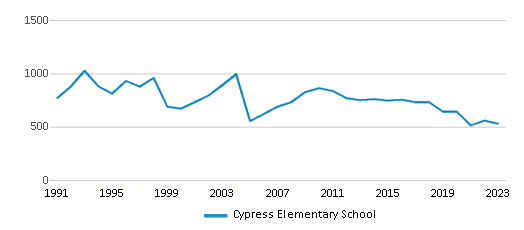
Gender %
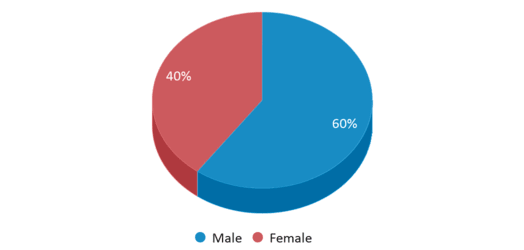
Total Classroom Teachers
40 teachers
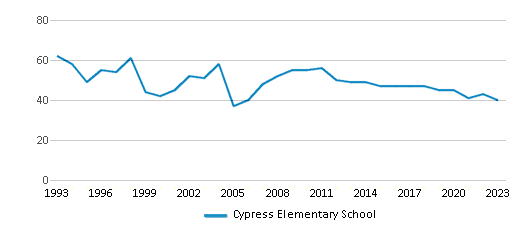
Students by Grade
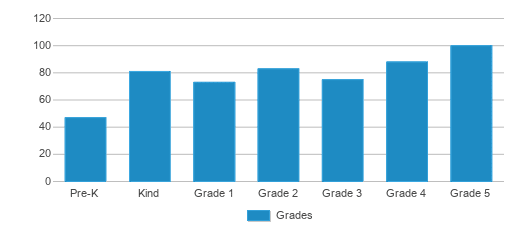
School Rankings
Cypress Elementary School ranks within the top 20% of all 8,188 schools in Texas (based off of combined math and reading proficiency testing data).
The diversity score of Cypress Elementary School is 0.61, which is less than the diversity score at state average of 0.64. The school's diversity has stayed relatively flat over five school years.
Overall Testing Rank
#1084 out of 8188 schools
(Top 20%)
(Top 20%)
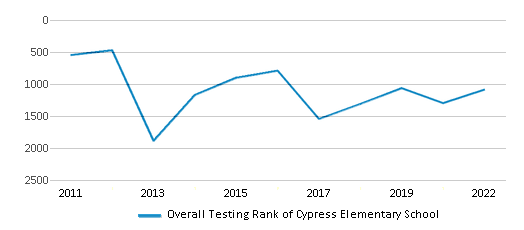
Math Test Scores (% Proficient)
57%
41%
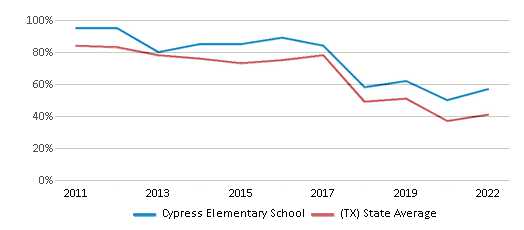
Reading/Language Arts Test Scores (% Proficient)
71%
51%
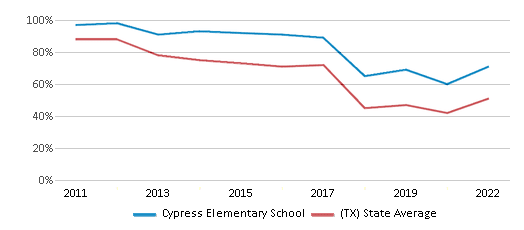
Science Test Scores (% Proficient)
45-49%
46%
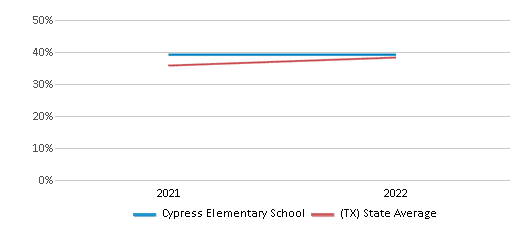
Student : Teacher Ratio
14:1
14:1
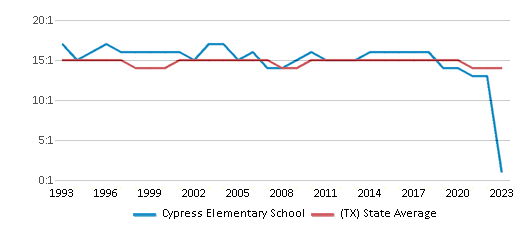
American Indian
n/a
n/a
Asian
8%
6%
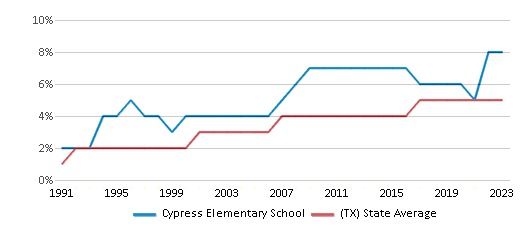
Hispanic
23%
53%
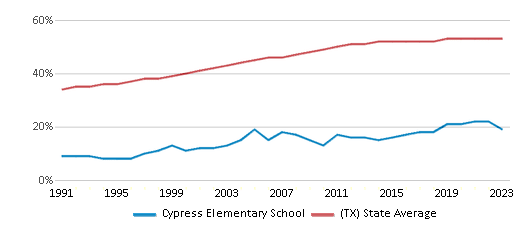
Black
2%
13%
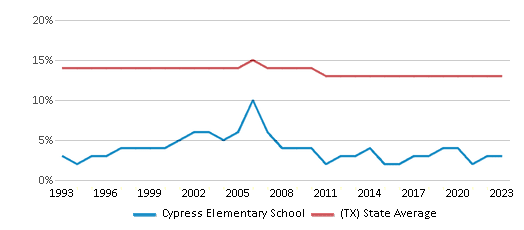
White
57%
25%
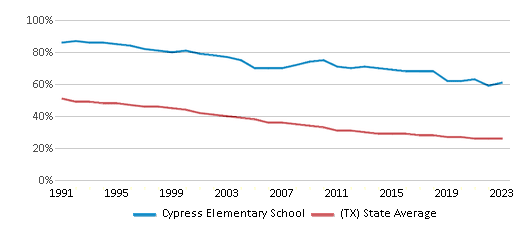
Hawaiian
n/a
n/a
Two or more races
10%
3%
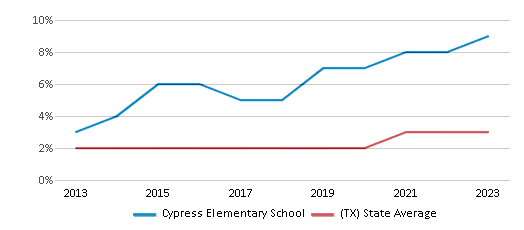
All Ethnic Groups
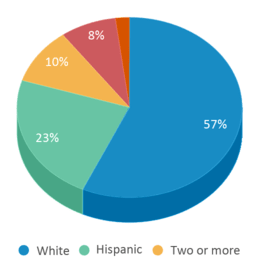
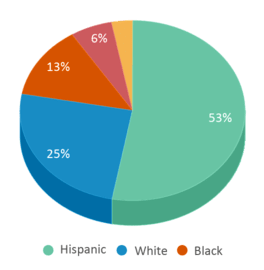
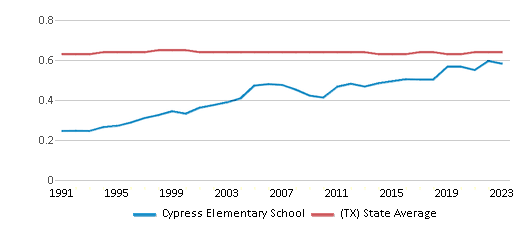
Participates in the National School Lunch Program (NSLP)
Yes
Eligible for Free Lunch
18%
57%
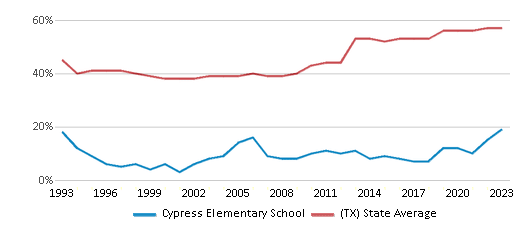
Eligible for Reduced Lunch
2%
5%
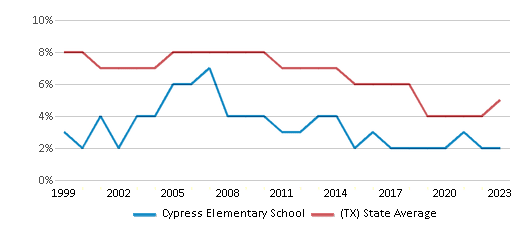
School Statewide Testing
School District Name
Source: National Center for Education Statistics (NCES), TX Dept. of Education
Profile last updated: 02/09/2025
Frequently Asked Questions
What is Cypress Elementary School's ranking?
Cypress Elementary School is ranked #1084 out of 8,188 schools, which ranks it among the top 20% of public schools in Texas.
What schools are Cypress Elementary School often compared to?
Cypress Elementary Schoolis often viewed alongside schools like Pauline Naumann Elementary School by visitors of our site.
What percent of students have achieved state testing proficiency in math and reading?
57% of students have achieved math proficiency (compared to the 41% TX state average), while 71% of students have achieved reading proficiency (compared to the 51% TX state average).
How many students attend Cypress Elementary School?
547 students attend Cypress Elementary School.
What is the racial composition of the student body?
57% of Cypress Elementary School students are White, 23% of students are Hispanic, 10% of students are Two or more races, 8% of students are Asian, and 2% of students are Black.
What is the student:teacher ratio of Cypress Elementary School?
Cypress Elementary School has a student ration of 14:1, which is equal to the Texas state average of 14:1.
What grades does Cypress Elementary School offer ?
Cypress Elementary School offers enrollment in grades Prekindergarten-5
What school district is Cypress Elementary School part of?
Cypress Elementary School is part of Leander Independent School District.
In what neighborhood is Cypress Elementary School located?
Cypress Elementary School is located in the Anderson Mill West neighborhood of Cedar Park, TX.
School Reviews
2 1/3/2011
Beware if planning to attend Cypress (or any LISD school) as there has been repeated rezoning of neighborhoods about every two years. My opinion is that the School Board doesn't appear to really care about concerns of parents and neighborhoods regarding the continual churning of attendance zones. I feel they will do what they want based on School Board Committees that run amok each year making rezoning recommendations that are based on both highly speculative attendance forecasts and weak statistical analysis in my opinion. The board has even gone so far as planning to divide wholly zoned neighborhoods into separate pieces to serve their long term plans. My opinion is that if you can tolerate being in a situation where neighborhoods are herded like mindless cattle, enjoy the thrills of not knowing what school your child will attend year-to-year, and can stomach watching your children cry their hearts out because he/she is losing their friends on a regular basis, then Cypress (and LISD) is the place for you. Otherwise, I would highly recommend prospective families look elsewhere if seeking to relocate or if deciding between Cypress (LISD) and private schooling.
5 9/26/2007
This school is the best. We’re very pleased and happy with the way teachers treated our kids. The academics of this school are quite challenging and excited my son and daughter. There are many good programs and excellence activities for kids in this school. I would highly recommended this school to any parents that are looking for a great school.
Review Cypress Elementary School. Reviews should be a few sentences in length. Please include any comments on:
- Quality of academic programs, teachers, and facilities
- Availability of music, art, sports and other extracurricular activities
Recent Articles

What Is A Charter School?
Explore the world of charter schools in this comprehensive guide. Learn about their history, how they operate, and the pros and cons of this educational innovation. Discover key facts about charter schools, including admission policies, demographics, and funding, as well as what to look for when considering a charter school for your child.

10 Reasons Why High School Sports Benefit Students
Discover the 10 compelling reasons why high school sports are beneficial for students. This comprehensive article explores how athletics enhance academic performance, foster personal growth, and develop crucial life skills. From improved fitness and time management to leadership development and community representation, learn why participating in high school sports can be a game-changer for students' overall success and well-being.

February 05, 2025
Understanding the U.S. Department of Education: Structure, Impact, and EvolutionWe explore how the Department of Education shapes American education, from its cabinet-level leadership to its impact on millions of students, written for general audiences seeking clarity on this vital institution.





